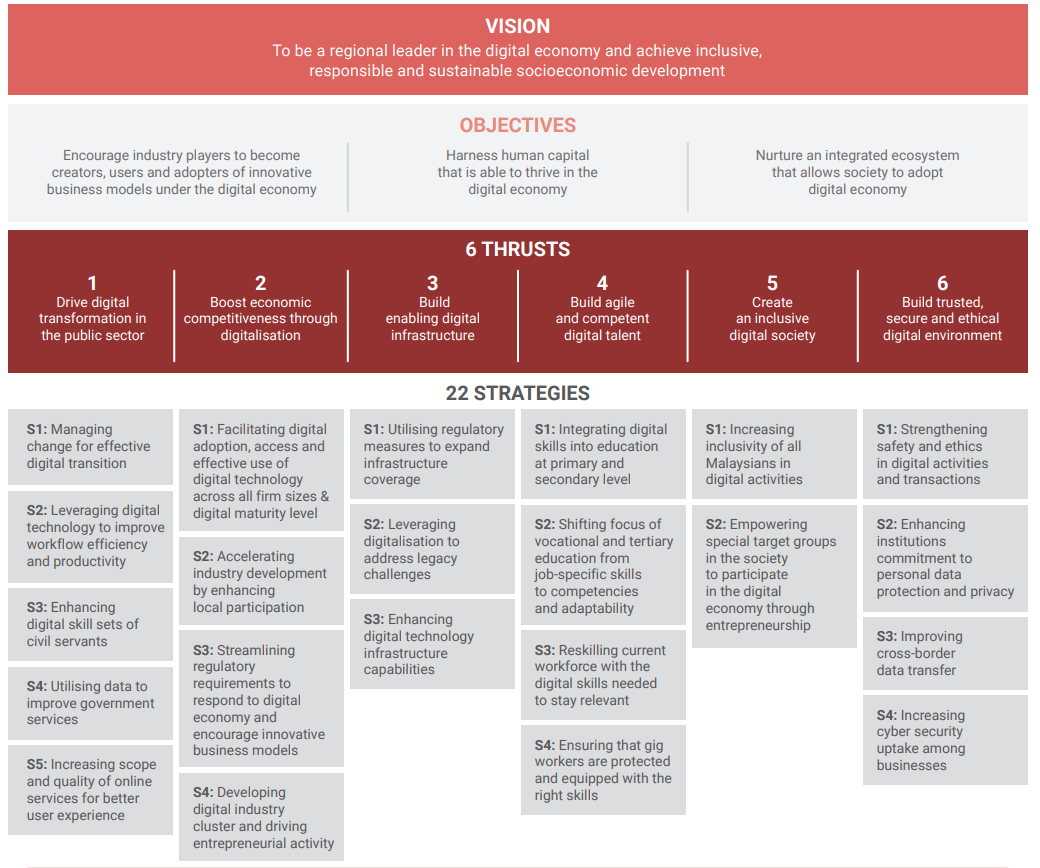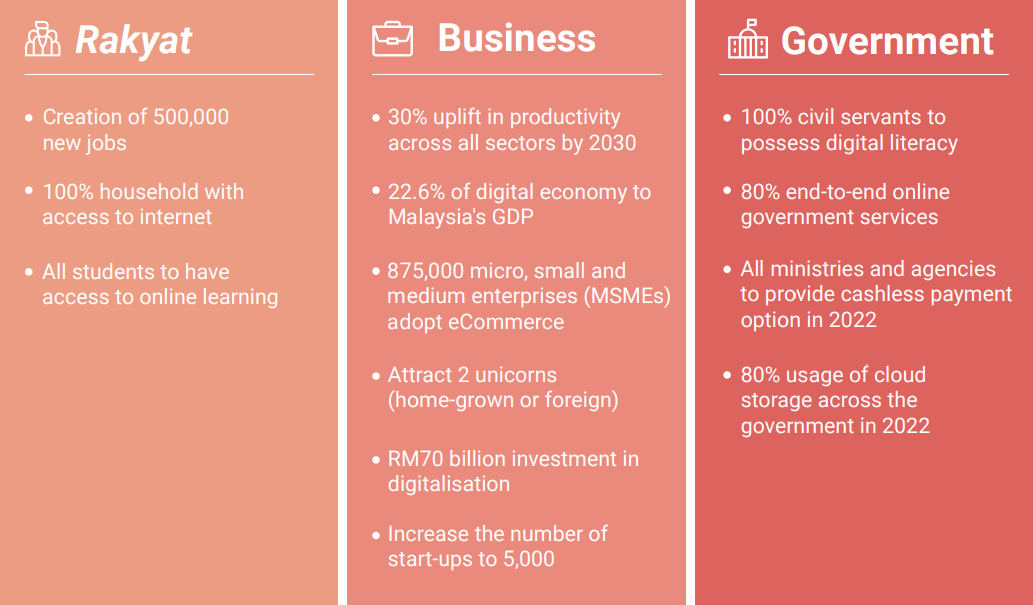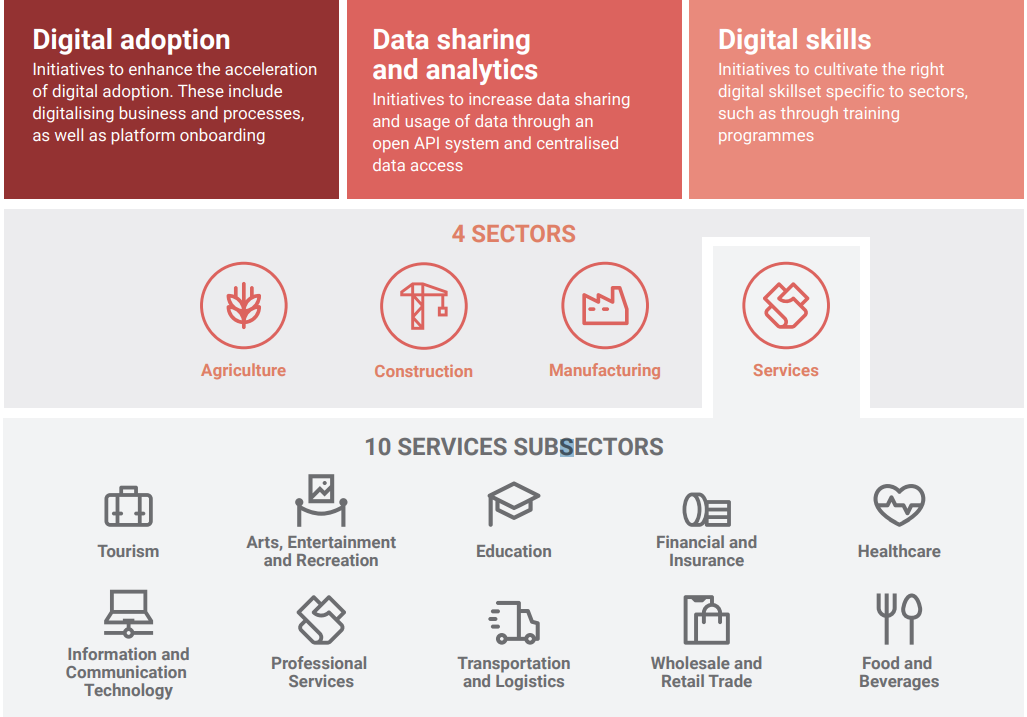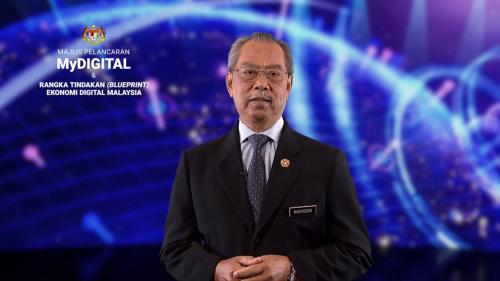MyDIGITAL to transform Malaysia into a digitally-driven, high-income nation by 2030
As digital technologies become increasingly prevalent, the digital economy will very soon become the foundation of the modern economy. As such, accelerating the digital economy is no longer an option but rather germane for Malaysia as a whole.
The Covid-19 pandemic has elevated the importance of the digital economy to ensure continuity in economic activities for the years to come. It has never been clearer that technology is a convenient tool for advancement in the best of times, and an essential tool of survival during the most challenging of crises, said Prime Minister Tan Sri Muhyiddin Yassin.
Recognising this, the Malaysian government on 19 February launched the MyDIGITAL initiative, which includes the Rangka Tindakan (Blueprint) Ekonomi Digital Malaysia. MyDIGITAL will complement the national development policies such as the Twelfth Malaysia Plan (12MP), and the Shared Prosperity Vision 2030 (WKB 2030).
“The MyDIGITAL initiative aims to empower all Malaysians, from Perlis to Sabah, to improve their lives in every aspect. Among others, it includes ideas and plans to improve digital literacy, creates high-income jobs, makes banking and finance business easier and more organised, provides virtual educational access to our children, and brings medical facilities to remote towns,” he said at the launch of MyDIGITAL.
MyDIGITAL also serves as a digital transformation direction plan that is able to drive the business sector to compete in the global arena by enhancing the expediency and efficiency of their operations, he added.
Muhyiddin emphasised that the MyDIGITAL initiative adopted a whole of nation approach. “In the face of future digital ecosystems, all stakeholders need to adapt as soon as possible to face whatever arising challenges in a connected nation.”
What is MyDIGITAL?
MyDIGITAL is a national initiative which symbolises the aspirations of the government to successfully transform Malaysia into a digitally-driven high-income nation, while at the same time being at the forefront of the digital economy in the region. The Rangka Tindakan (Blueprint) Ekonomi Digital Malaysia spells out the efforts and initiatives to deliver the aspirations of MyDIGITAL. The blueprint charts the trajectory of the country’s digital economy and builds the foundation to drive digitalisation across Malaysia including bridging the digital divide.
The Rangka Tindakan (Blueprint) Ekonomi Digital Malaysia will help to unlock Malaysia’s full potential to benefit from the digital economy.
There is no one universal definition of digital economy as everyone has different benchmarking to it. Malaysia for instance, defines digital economy as: “Economic and social activities that involve the production and use of digital technology by individuals, businesses and government.”
The Rangka Tindakan (Blueprint) Ekonomi Digital Malaysia is led by the following guiding principles:
- Inclusivity: to ensure nobody is left behind as a result of digitalisation.
- Ethics: to ensure that data and digital tools are used in an ethical manner.
- Trust: to ensure the growth of the digital economy, without compromising privacy and cyber security.
The blueprint outlines three objectives and six strategic thrusts, supported by 22 strategies, 48 national initiatives and 28 sectoral initiatives.

The implementation of this blueprint is divided into three phases.
Phase 1 (2021-2022) aims to accelerate adoption towards strengthening the digital foundation needed for the rapid and smooth rollout of Phase 2 and 3. In Phase 2 (2023-2025), the focus shifts to driving digital transformation and inclusion across the digital economy, emphasising inclusivity among the rakyat and all businesses. Phase 3 (2026-2030) will chart the pathway for strong, sustainable growth in the decades to come, positioning Malaysia to become a regional market producer for digital products and digital solutions provider.
The blueprint was formulated through a comprehensive study with the active involvement of various stakeholders including the Ministries and their agencies, the private sector players, and civil society organisations (CSOs). A number of stakeholder engagement sessions with industry players were conducted, including nearly 500 companies over 50 industry associations and technology providers.
Key targets to be achieved by 2025:

The Prime Minister said the initiatives under MyDIGITAL are expected to attract new investments of about RM70 billion from within and outside the country. This includes RM21 billion which will be invested over the next five years through the National Digital Network (JENDELA) project to strengthen existing connectivity.
Muhyiddin also announced an investment of RM15 billion over the next 10 years for the implementation of 5G nationwide. This will create approximately 105,000 job opportunities. The effort will be carried out through a special purpose vehicle under the Malaysian government which will be given the appropriate spectrum to own, implement and manage the 5G infrastructure.
“By the end of this year, the rakyat will be able to enjoy the 5G technology in stages,” he highlighted.
He also announced that the government has so far given conditional approvals to four Cloud Service Provider (CSP) companies – Microsoft, Google, Amazon and Telekom Malaysia – to build and manage hyper-scale data centres and cloud services. Investment from these companies is expected to reach between RM12 billion to RM15 billion over the next five years.
Sectoral initiatives
The blueprint outlines a total of 28 sectoral initiatives under three themes, namely digital adoption, data sharing and analytics, and digital skills. The four sectors covered are agriculture, construction, manufacturing and services. Under services sector, 10 subsectors have been identified.

The future of Malaysia envisioned by MyDIGITAL
- The rakyat enjoying improved digital literacy, more high-paying jobs, improved social wellbeing and environmental sustainability.
- Businesses, including micro, small and medium enterprises (MSMEs) that form the backbone of Malaysia's economy, will enjoy greater opportunities to build and expand locally, regionally and even globally through digital revenue streams, more opportunities to integrate between economic sectors, and to be more cost-efficient through shared economy.
- A digitally-enabled government will provide integrated end-to-end online government services which are more efficient, effective and transparent.
RM12.50 / month
- Unlimited access to award-winning journalism
- Comment and share your opinions on all our articles
- Gift interesting stories to your friends
- Tax deductable
